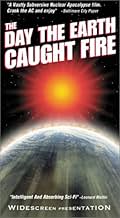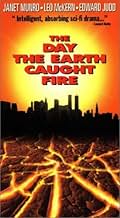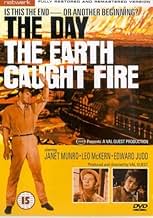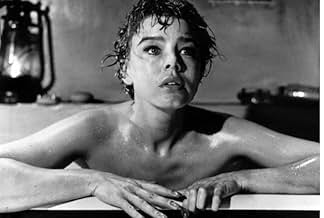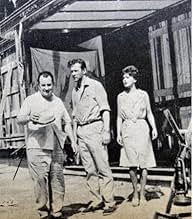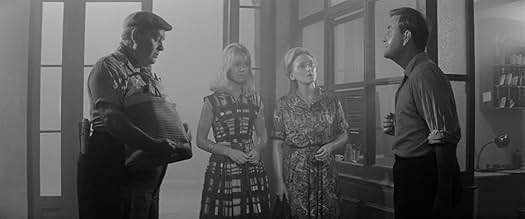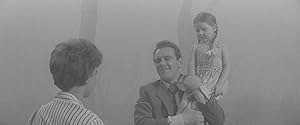O Dia em Que a Terra se Incendiou
Adicionar um enredo no seu idiomaWhen the U.S. and Russia unwittingly test atomic bombs at the same time, it alters the nutation (axis of rotation) of the Earth.When the U.S. and Russia unwittingly test atomic bombs at the same time, it alters the nutation (axis of rotation) of the Earth.When the U.S. and Russia unwittingly test atomic bombs at the same time, it alters the nutation (axis of rotation) of the Earth.
- Direção
- Roteiristas
- Artistas
- Ganhou 1 prêmio BAFTA
- 1 vitória e 1 indicação no total
- Constable
- (não creditado)
- Mother
- (não creditado)
- 1st Sub-Editor
- (não creditado)
- Policeman
- (não creditado)
- Printer in Printroom
- (não creditado)
- Copy Desk
- (não creditado)
- Copy Boy
- (não creditado)
- Man at Water Station
- (não creditado)
- Direção
- Roteiristas
- Elenco e equipe completos
- Produção, bilheteria e muito mais no IMDbPro
Avaliações em destaque
Although the plot is quite similar to that of 'When Worlds Collide', the realism of the characters and setting really lift the whole film far above its contemporaries. Its use of journalists to tell the story is similar to that of many of the classic works of literary science fiction (HG Wells' War Of The Worlds or John Wyndham's Kraken Wakes for example) and it follows a similar apocalyptic template as well.
The theme of mankind's actions causing havoc for the globe, which was originally a criticism of the cold war, is still very relevant today for quite different reasons. The parallel with global warming is obvious, and the graphic depiction of the effects of this are all the more disturbing because we see similar effects, on a smaller scale, around the world on a day to day basis. The film is shocking in its bleak vision of the havoc that mankind has brought upon himself.
Basically, this is the benchmark for all serious science-fiction, and makes a perfect partner for the other great of the cold war era, "The Day the Earth Stood Still".
Was any science fiction movie ever more ambitious than this one? The staggering opening, tinted in reddish yellow and brilliantly composed in widescreen, looks like Tarkovsky and Lars von Trier, and has the same dry wasteland quality to it. Callous and unpublicized nuclear tests by both the Soviet Union and the US have upset the environment, causing record-breaking heat waves, floods, cyclones, eclipses, and what not, and we gradually find out that Earth has tilted and is hurtling towards the Sun where, in four months' time, the universe will savor "the delightful smell of charcoaled mankind", as put by a cynical newspaperman. The largest nuclear bomb ever made will now be detonated in Siberia, and no one knows what will happen now ... The environmentalist discourse seems extremely contemporary to us today.
Now, how to make intelligent, thoughtful entertainment out of that pulp?! Leave it to writer-director Val Guest who more than rose to the task. He put a heartbroken, newly divorced and slightly alcoholized reporter in the center, working for the London Daily News. He tries, with his science editor and surrogate father, to delve into what went wrong and who is responsible, and he falls in love with a switchboard girl with a cleavage. All this to keep the movie grounded, the drama realistic. All of this naturalistic drama is cross-edited with stock newsreel footage of natural disasters, and it works. It works supremely well, and you are sucked into the action, as the end of the world approaches.
All the actors are brilliant, not least Edward Judd as the main reporter, cynical, witty, vulnerable.
The idea came to director Val Guest during the Cold War in 1954, and it is under that decade's spirit that the movie is better appreciated. I remember seeing it when it opened, and I have never forgotten that experience, specially its tinted sequence. Sixty years later I am able to see it again, and it is still the same notable film, not the least affected by today's cinematic technology, because, in its core, Guest's motivation -the worry for the actions of mindless men who struggle to control the Earth- is still relevant.
If it is not highly regarded today as "The Day the Earth Stood Still", I think it has to do with the fact that Universal sold it as a B movie in the United States (although not so by British Lion in the UK, where it was a huge success, and won the film industry's top prize for its screenplay) and because not too many critics paid attention to it and wrote positive reviews, establishing it as an important science-fiction movie since then. Although there are very few re-enacted disaster scenes and it relies upon footage of real catastrophes, the tension is handled effectively in the newspaper's office where most of the action takes place, with its overlapping dialogues and constant flow of new information; and in the development of the romantic story in the midst of violence and terror in the streets. Edward Judd, Janet Munro and Leo McKern contribute good performances to this fine movie, shot in wide-screen Dyaliscope.
Você sabia?
- CuriosidadesAs the Earth heats up, Bill McGuire asks for information on the melting point of "everything from steel to my glass eye". Leo McKern had a glass eye.
- Erros de gravaçãoIn the movie, several people in North London contract "typhus" from contaminated water. Evidently the script confused "typhus" and "typhoid fever." Typhus is spread by parasites, such as fleas or mites; not contaminated water. Typhoid fever can be spread by contaminated food or water.
- Citações
Peter Stenning: So Man has sown the wind - and reaped the whirlwind. Perhaps in the next few hours, there will be no remembrance of the past, and no hope for the future that might have been. All the works of Man will be consumed in the great fire out of which he was created. But perhaps at the heart of the burning light into which he has thrust his world, there is a heart that cares more for him, than he has ever cared for himself. And if there is a future for Man - insensitive as he is, proud and defiant in his pursuit of power - let him resolve to live it lovingly; for he knows well how to do so. Then he may say once more: Truly the light is sweet; and what a pleasant thing it is for the eyes to see the Sun.
- Cenas durante ou pós-créditosThere are no end credits whatsoever (not even a "The End" caption); merely a fade to black.
- Versões alternativasAlthough listed as cut by the BBFC, the then censor John Trevelyan passed the film uncut according to his memoirs. The 'X' certificate was given due to the subject matter, and occasional tough language, being unsuitable for anyone under the age of 16. Video and DVD releases are now rated PG.
Principais escolhas
- How long is The Day the Earth Caught Fire?Fornecido pela Alexa
Detalhes
- Data de lançamento
- País de origem
- Idioma
- Também conhecido como
- The Day the Earth Caught Fire
- Locações de filme
- Empresa de produção
- Consulte mais créditos da empresa na IMDbPro
Bilheteria
- Orçamento
- £ 200.000 (estimativa)
- Tempo de duração
- 1 h 39 min(99 min)
- Proporção
- 2.35 : 1



